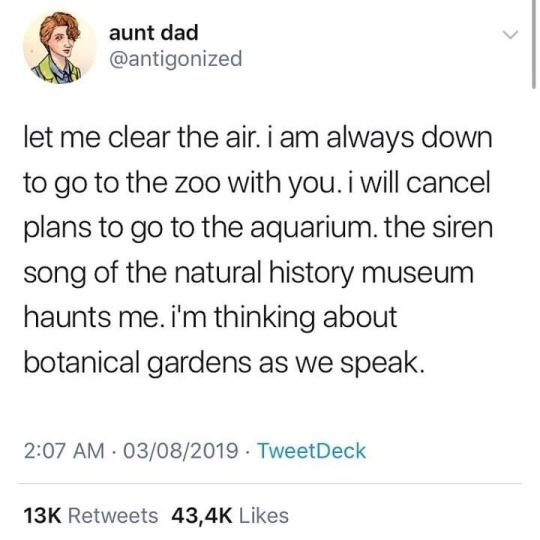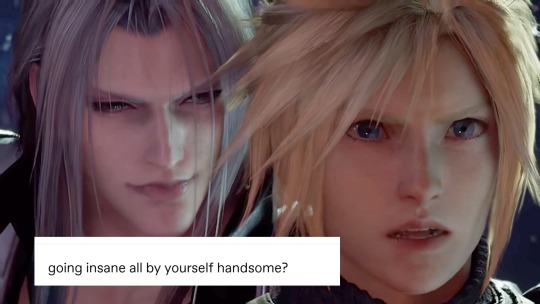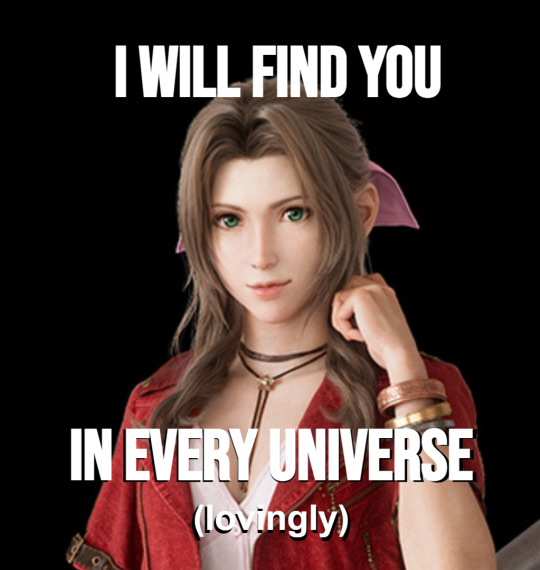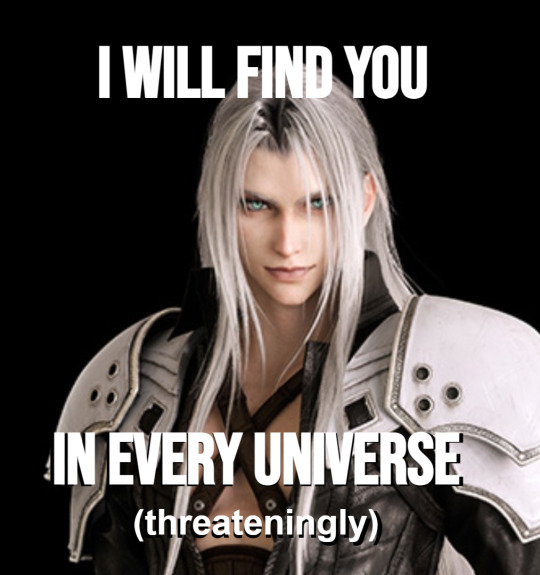Text
Something something the difficulties of feeling ignored as a demiromantic greyromantic In the aromantic umbrella. Like yes I belong here too!!! Every relationship I’ve been in the past had felt wrong and the love just wasn’t there!!! Romantic attraction just hasn’t been a thing!!! But now I have a romantic partner!!! One that I love so so so so very much!!! That doesn’t make my experiences being aro any less valid!!! But with so many aro posts I fucking feel like it does sometimes!!!
42 notes
·
View notes
Text
for my fellow psychotics who struggle with thinking someone is in their house, a method I’ve found that really works are these guys:

i put them on my front door and anytime it opens they ring. that way if i think someone has broken in or i see someone who isn’t there i can think back to if the bells have rung, and if they haven’t i can assure myself it’s not real. obviously it’s not fool proof, like if you are prone to auditory hallucinations, but it has really helped me calm down in time to avoid major psychotic breaks. it’s a real lifesaver
nonpsychotics encouraged to rb
92K notes
·
View notes
Photo

i know you belong to somebody new,
but tonight you belong to me.
2K notes
·
View notes
Text

HAPPY 8TH ANNIVERSARY OF YUGIOH THE DARK SIDE OF DIMENSIONS🎉🎉🎉🎉🎉🎉🎉
8 years ago even a few weeks before this game-changing gay movie was out, I knew my life as a longtime Yugioh fan, as well as my life in general, would never be the same. I owe the DSoD a bunch: I drew hundreds of pieces of fan art; I met awesome friends both online and in person; and most importantly, the DSoD was what significantly helped me get through hard times. 🥹🥹
I tried the pixel art style this time. I'm not sure it worked the way I had intended to, but I did my best😆
595 notes
·
View notes
Text
Y'all, the world is sleeping on what NASA just pulled off with Voyager 1
The probe has been sending gibberish science data back to Earth, and scientists feared it was just the probe finally dying. You know, after working for 50 GODDAMN YEARS and LEAVING THE GODDAMN SOLAR SYSTEM and STILL CHURNING OUT GODDAMN DATA.
So they analyzed the gibberish and realized that in it was a total readout of EVERYTHING ON THE PROBE. Data, the programming, hardware specs and status, everything. They realized that one of the chips was malfunctioning.
So what do you do when your probe is 22 Billion km away and needs a fix? Why, you just REPROGRAM THAT ENTIRE GODDAMN THING. Told it to avoid the bad chip, store the data elsewhere.
Sent the new code on April 18th. Got a response on April 20th - yeah, it's so far away that it took that long just to transmit.
And the probe is working again.
From a programmer's perspective, that may be the most fucking impressive thing I have ever heard.
93K notes
·
View notes
Text
culture isn’t modular
I did a thread (actually several) on Twitter a few years ago about Christianity’s attempts to paint itself as modular, and I’ve been seeing them referenced here in the cultural christianity Discourse, and a few people have DMed me asking me to post it here, so here’s a rehash of several of those threads:
A big part of why Christian atheists have trouble seeing how culturally Christian they still are is that Christianity advertises itself as being modular, which is not how belief systems have worked for most of human history.
A selling point of Christianity has always been the idea that it’s plug-and-play: you don’t have to stop being Irish or Korean or Nigerian to be Christian, you don’t have to learn a new language, you keep your culture.
And you’re just also Christian.
(You can see, then, why so many Christian atheists struggle with the idea that they’re still Christian–to them, Christianity is this modular belief in God and Jesus and a few other tenets, and everything else is… everything else. Which is, not to get ahead of myself, very compatible with some tacit white supremacy: the “everything else” is goes unexamined for its cultural specificity. It’s just Normal. Default. Neutral.)
Evangelicals in particular love to contrast this to Islam, to the idea that you have to learn Arabic and adopt elements of Arab culture to be Muslim, which helps fuel the image of Islam as a Foreign Ideology that’s taking over the West.
The rest of us don’t have that particular jack
Meanwhile, Christians position Christianity as a modular component of your life. Keep your culture, your traditions, your language and just swap out your Other Religion Module for a Christianity Module.
The end game is, in theory, a rainbow of diverse people and cultures that are all one big happy family in Christ. We’re going to come back to how Christianity isn’t actually modular, but for the moment, let’s talk about it as if it had succeeded in that design goal.
Even if Christianity were successfully modular, if it were something that you could just plug in to the Belief System Receptor in a culture and leave the rest of it undisturbed, the problem is most cultures don’t have a modular Belief System Receptor. Spirituality has, for the entirety of human history, not been something that’s modular. It’s deeply interwoven with the rest of culture and society. You can’t just pull it out and plug something else in and have the culture remain stable.
(And to be clear, even using the term “spirituality” here is a sop to Christianity. What cultures have are worldviews that deal with humanity’s place in the universe/reality; people’s relationships to other people; the idea of individual, societal, or human purpose; how the culture defines membership; etc. These may or may not deal with the supernatural or “spiritual.”)
And so OF COURSE attempting to pull out a culture’s indigenous belief system and replace it with Christianity has almost always had destructive effects on that culture.
Not only is Christianity not representative of “religion” full stop, it’s actually arguably *anomalous* in its attempt to be modular (and thus universal to all cultures) rather than inextricable from culture.
Now, of course, it hasn’t actually succeeded in that–the US is a thoroughly Christian culture–but it does lead to the idea that one can somehow parse out which pieces of culture are “religious” versus which are “secular”. That framing is antithetical to most cultures. E.g. you can’t separate the development of a lot of cultural practices around what people eat and how they get it from elements of their worldview that Christians would probably label “religious.” But that entire *framing* of religious vs. secular is a Christian one.
Is Passover a religious holiday or a secular one? The answer isn’t one or the other, or neither, or both. It’s that the framing of this question is wrong.
And Christianity isn’t a plugin, however much it wants to be
Moreover, Christianity isn’t actually culture-neutral or modular.
It’s easy for this to get obscured by seeing Christianity as a tool of particular cultures’ colonialism (e.g. the British using Christianity to spread British culture) or of whiteness in general, and not seeing how Christianity itself is colonial. This helps protect the idea that “true” Christianity is good and innocent, and if priests or missionaries are converting people at swordpoint or claiming land for European powers or destroying indigenous cultures, that must be a misuse of Christianity, a “fake” or “corrupted” Christianity.
Never mind that for every other culture, that culture is what its members do. Christianity, uniquely, must be judged on what it says its ideals are, not what it actually is.
Mistaking the engine for the exhaust
But it’s not just an otherwise innocent tool of colonialism: it’s a driver of it.
At the end of the day, it’s really hard to construct a version of the Great Commission that isn’t inherently colonial. The end-goal of a world in which everyone is Christian is a world without non-Christian cultures. (As is the end goal of a world in which everyone is atheist by Christian definitions.)
Yet we focus on the way Christianity came with British or Spanish culture when they colonized a place–the churches are here because the Spaniards who conquered this area were Catholic–and miss how Christianity actually has its own cultural tropes that it brings with it. It’s more subtle, of course, when Christianity didn’t come in explicitly as the result of military conquest.
Or put another way, those cultures didn’t just shape the Christianity they brought to places they colonized–they were shaped by it. How much of the commonality between European cultures is because of Christianity?
It’s not all a competition
A lot of Christians (cultural and practicing), if you push them, will eventually paint you a picture of a very Hobbesian world in which all religions, red in tooth and claw, are trying to take over the world. It’s the “natural order” to attempt to eliminate all cultures but your own.
If you point out to them that belief and worldview are deeply personal, and proselytizing is objectifying, because you’re basically telling the person you’re proselytizing to that who they are is wrong, you often get some version of “that’s how everyone is, though.”
Like we all go through life seeing other humans as incomplete and fundamentally flawed and the only way to “fix” them is to get them to believe what we believe. And, like, that is not how everyone relates to others?
But it’s definitely how both practicing Christians and Christian antitheists relate to others. If, for Christians, your lack of Jesus is a fundamental flaw in you that needs to be fixed, for New Atheists, your “religion” (that is, your non-Christian culture) is a fundamental flaw in you that needs to be fixed. Neither Christians nor New Atheists are able to relate to anyone else as fine as they are. It’s all a Hobbesian zero-sum game. It’s all a game of conversion with only win and loss conditions. You are, essentially, only an NPC worth points.
The idea of being any other way is not only wrong, but impossible to them. If you claim to exist in any other way, you are either deluded or lying.
So, we get Christian atheists claiming that if you identify as Jewish, you can’t really be an atheist. Or sometimes they’ll make an exception for someone who’s “only ethnically Jewish.” If the only way you relate to your Jewishness is as ancestry, then you can be an atheist. Otherwise, you’re lying.
Or, if you’re not lying, you’re deluded. You just don’t understand that there’s no need for you to keep any dietary practices or continue to engage in any form of ritual or celebrate any of those “religious” Jewish holidays, and by golly, this here “ex”-Christian atheist is here to separate out for you which parts of your culture are “religious” and which ones are “secular.”
Religious/secular is a Christian distinction
A lot of atheists from Christian backgrounds (whether or not they were raised explicitly Christian) have trouble seeing how Christian they are because they’ve accepted the Christian idea that “religion” is modular. (If we define “religion” the way Christians (whether practicing or cultural) define it, Christianity might be the only religion that actually exists. Maybe Islam?)
When people from non-Christian cultures talk about the hegemonically Christian and white supremacist nature of a lot of atheism, it reflects how outside of Christianity, spirituality/worldview isn’t something you can just pull out of a culture.
Christian atheists tend to see the cultural practices of non-Christians as “religious” and think that they should give them up (talk to Jewish atheists who keep kosher about Christian atheist reactions to that). But because Christianity positions itself as modular, people from Christian backgrounds tend not to see how Christian the culture they imagine as “neutral” or “normal” actually is. In their minds, you just pull out the Christianity module and are left with a neutral, secular society.
So, if people from non-Christian backgrounds would just give up their superstitions, they’d look the same as Christian atheists.
Your secularism is specifically post-Christian
Of course, that culture with the Christianity module pulled out ISN’T neutral. So the idea that that’s what “secular society” should look like ends up following the same pattern as Christian colonialism throughout history: the promise that you can keep your culture and just plug in a different belief system (or, purportedly, a lack of a belief system), which has always, always been a lie. The secular, “enlightened” life that most Christian atheists envision is one that’s still built on white, western Christianity, and the idea that people should conform to it is still attempting to homogenize society to a white Christian ideal.
For people from cultures that don’t see spirituality as modular, this is pretty obvious. It’s obvious to a lot of people from non-white Christian cultures that have syncretized Christianity in a way that doesn’t truck with the modularity illusion.
I also think, even though they’re not conceptualizing it in these terms, that it’s actually obvious to a lot of evangelicals. (The difference being that white evangelical Christianity enthusiastically embraces white supremacy, so they see the destruction of non-Christian culture as good.) But I think it’s invisible to a lot of mainline non-evangelical Christians, and it’s definitely invisible to a lot of people who leave Christianity.
And that inability to see culture outside a Christian framing means that American secularism is still shaped like Christianity. It’s basically the same text with a few sentences deleted and some terms replaced.
Which, again, is by design. The idea that you can deconvert to (Christian) atheism and not have to change much besides your opinions about God is the mirror of how easy it’s supposed to be to convert to Christianity.
Human societies don’t follow evolutionary biology
The Victorian Christian framing underlying current Western ideas of enlightened secularism, that religious practice (and human culture in general) is subject to the same sort of unilateral, simple evolution toward a superior state to which they, at the time, largely reduced biological evolution, is deeply white supremacist.
It posits religious evolution as a constantly self-refining process from “primitive” animism and polytheism to monotheism to white European/American Christianity. For Christians, that’s the height of human culture. For ex-Christians, the next step is Christian-derived secularism.
Maybe you’ve seen this comic?
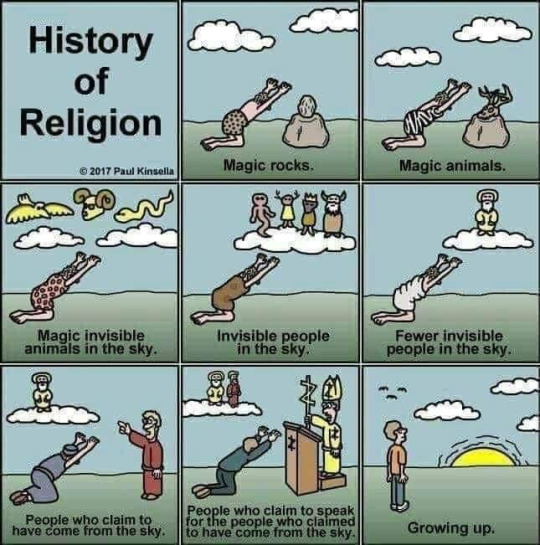
The thing is, animism isn’t more “primitive” than polytheism, and polytheism isn’t more “primitive” than monotheism. Older doesn’t mean less advanced/sophisticated/complex. Hinduism isn’t more “primitive” than Judaism just because it’s polytheistic and Judaism is monotheistic.
Human cultures continue to change and adapt. (Arguably, older religions are more sophisticated than newer ones because they’ve had a lot more time to refine their practices and ideologies instead of having to define them.) Also, not all cultures are part of the same family tree. Christianity and Islam may be derived from Judaism, but Judaism and Hinduism have no real relationship to one another.
But in this worldview, Christianity is “normal” religion, which is still more primitive than enlightened secularism, but more advanced than all those other primitive, superstitious, irrational beliefs.
Just like Christians, when Christian atheists do try to make room for cultures that aren’t white and European-derived, the tacit demand is “okay, but you have to separate out the parts of your culture that the Christian sacred-secular divide would deem ‘religious.’”
Either way, people from non-Christian cultures, if they’re to be equals, are supposed to get with the program and assimilate.
You’re not qualified to be a universal arbiter of what culture is good
Christian atheists usually want everyone to unplug that Religion module!
So, for example, you have ex-Christian atheists who are down with pluralism trying to get ex-Christian atheists who aren’t to leave Jews alone by pointing out that you can be atheist and Jewish.
But some of us aren’t atheist. (I’m agnostic by Christian standards.) And the idea that Jews shouldn’t be targets for harassment because they can be atheists and therefore possibly have some common sense is still demanding that people from other cultures conform to one culture’s standard of what being “rational” is.
Which, like, is kind of galling when y’all don’t even understand what “belief in G-d” means to Jews, and people from a culture that took until the 1800s to figure out that washing their hands was good are setting themselves up as the Universal Arbiters of Rationality.
(BTW, most of this also holds true for non-white Christianity, too. I guarantee you most white Christian atheists don’t have a good sense of what role church plays in the lives of Black communities, so maybe shut up about it.)
In any case, reducing Christianity–a massive, ambient phenomenon inextricable from Western culture–to the specific manifestation of Christian practice that you grew up with is, frankly, absurd.
And you can’t be any help in deconstructing hegemony when you refuse to perceive it and understand that it isn’t something you can take off like a garment, and you probably won’t ever recognize and uproot all the ways in which it affects you, especially when you are continuing to live within it.
What hegemony doesn’t want you to know
One of the ways hegemony sustains and perpetuates itself is by reinforcing the idea not so much that other ways of being and knowing are evil (although that’s usually a stage in an ideology becoming hegemonic), but that they’re impossible. That they don’t actually exist.
See, again, the idea that anyone claiming to live differently is either lying or deluded.
There are few clearer examples of how pervasive Christian hegemony is than Christian atheists being certain every religion works like Christianity. Hegemonic Christianity wants you to think that all cultures work like Christianity because it wants their belief systems to be modular so you can just …swap them. And it wants to pretend that culture/worldview is a free market where it can just outcompete other cultures.
But that’s… not how anything works.
And the truth of the matter is that white nationalist Christians shoot at synagogues and Sikh temples and mosques because those other ways of being can’t be allowed to exist.
They don’t shoot at atheist conventions because there’s room in hegemonic Christianity for Christian atheists precisely because Christian atheists are still culturally Christian. Their atheism is Christian-shaped.
They may not like you. They’re definitely going to try to convert you. They may not want you to be able to hold public office or teach their kids.
But the only challenge you’re providing is that of The Existence of Disbelief. And that’s fine. That makes you a really safe Other to have around. You can See The Light and not have to change much.
What you’re not doing is providing an example of a whole other way of being and knowing that (often) predates Christianity and is completely separate from it and has managed to survive it and continue to live and thrive (there’s a reason Christians like to speak of Jews and Judaism in the past tense, and it’s similar to the reason white people like to speak of indigenous peoples of the Americas in the past tense).
That’s not a criticism–it’s fine to just… be post-Christian. There’s not actually anything wrong with being culturally Christian. The problems come in when you start denying that it’s a thing, or insisting that you, unique among humankind, are above Having A Culture.
But it does mean that you don’t pose the same sort of threat to Christianity that other cultures do, and hence, less violence.
7K notes
·
View notes
Text
"In response to last year’s record-breaking heat due to El Niño and impacts from climate change, Indigenous Zenù farmers in Colombia are trying to revive the cultivation of traditional climate-resilient seeds and agroecology systems.
One traditional farming system combines farming with fishing: locals fish during the rainy season when water levels are high, and farm during the dry season on the fertile soils left by the receding water.
Locals and ecologists say conflicts over land with surrounding plantation owners, cattle ranchers and mines are also worsening the impacts of the climate crisis.
To protect their land, the Zenù reserve, which is today surrounded by monoculture plantations, was in 2005 declared the first Colombian territory free from GMOs.
...
In the Zenù reserve, issues with the weather, climate or soil are spread by word of mouth between farmers, or on La Positiva 103.0, a community agroecology radio station. And what’s been on every farmer’s mind is last year’s record-breaking heat and droughts. Both of these were charged by the twin impacts of climate change and a newly developing El Niño, a naturally occurring warmer period that last occurred here in 2016, say climate scientists.
Experts from Colombia’s Institute of Hydrology, Meteorology and Environmental Studies say the impacts of El Niño will be felt in Colombia until April 2024, adding to farmers’ concerns. Other scientists forecast June to August may be even hotter than 2023, and the next five years could be the hottest on record. On Jan. 24, President Gustavo Petro said he will declare wildfires a natural disaster, following an increase in forest fires that scientists attribute to the effects of El Niño.
In the face of these changes, Zenù farmers are trying to revive traditional agricultural practices like ancestral seed conservation and a unique agroecology system.

Pictured: Remberto Gil’s house is surrounded by an agroforestry system where turkeys and other animals graze under fruit trees such as maracuyá (Passiflora edulis), papaya (Carica papaya) and banana (Musa acuminata colla). Medicinal herbs like toronjil (Melissa officinalis) and tres bolas (Leonotis nepetifolia), and bushes like ají (Capsicum baccatum), yam and frijol diablito (beans) are part of the undergrowth. Image by Monica Pelliccia for Mongabay.
“Climate change is scary due to the possibility of food scarcity,” says Rodrigo Hernandez, a local authority with the Santa Isabel community. “Our ancestral seeds offer a solution as more resistant to climate change.”
Based on their experience, farmers say their ancestral seed varieties are more resistant to high temperatures compared to the imported varieties and cultivars they currently use. These ancestral varieties have adapted to the region’s ecosystem and require less water, they tell Mongabay. According to a report by local organization Grupo Semillas and development foundation SWISSAID, indigenous corn varieties like blaquito are more resistant to the heat, cariaco tolerates drought easily, and negrito is very resistant to high temperatures.
The Zenù diet still incorporates the traditional diversity of seeds, plant varieties and animals they consume, though they too are threatened by climate change: from fish recipes made from bocachico (Prochilodus magdalenae), and reptiles like the babilla or spectacled caiman (Caiman crocodilus), to different corn varieties to prepare arepas (cornmeal cakes), liquor, cheeses and soups.
“The most important challenge we have now is to save ancient species and involve new generations in ancestral practice,” says Sonia Rocha Marquez, a professor of social sciences at Sinù University in the city of Montería.
...[Despite] land scarcity, Negrete says communities are developing important projects to protect their traditional food systems. Farmers and seed custodians, like Gil, are working with the Association of Organic Agriculture and Livestock Producers (ASPROAL) and their Communitarian Seed House (Casa Comunitaria de Semillas Criollas y Nativas)...

Pictured: Remberto Gil is a seed guardian and farmer who works at the Communitarian Seed House, where the ASPROL association stores 32 seeds of rare or almost extinct species. Image by Monica Pelliccia for Mongabay.
Located near Gil’s house, the seed bank hosts a rainbow of 12 corn varieties, from glistening black to blue to light pink to purple and even white. There are also jars of seeds for local varieties of beans, eggplants, pumpkins and aromatic herbs, some stored in refrigerators. All are ancient varieties shared between local families.
Outside the seed bank is a terrace where chickens and turkeys graze under an agroforestry system for farmers to emulate: local varieties of passion fruit, papaya and banana trees grow above bushes of ají peppers and beans. Traditional medicinal herbs like toronjil or lemon balm (Melissa officinalis) form part of the undergrowth.
Today, 25 families are involved in sharing, storing and commercializing the seeds of 32 rare or almost-extinct varieties.
“When I was a kid, my father brought me to the farm to participate in recovering the land,” says Nilvadys Arrieta, 56, a farmer member of ASPROAL. “Now, I still act with the same collective thinking that moves what we are doing.”
“Working together helps us to save, share more seeds, and sell at fair price [while] avoiding intermediaries and increasing families’ incomes,” Gil says. “Last year, we sold 8 million seeds to organic restaurants in Bogotà and Medellín.”
So far, the 80% of the farmers families living in the Zenù reserve participate in both the agroecology and seed revival projects, he adds."
-via Mongabay, February 6, 2024
1K notes
·
View notes
Text
I always think it's very strange when depictions of "what XYZ ancient settlement might have looked like" show unpainted and unadorned buildings, as though we haven't decorated our houses with shiny materials and bright colors for the past hundreds of thousands of years.
I get why these things are omitted—our reconstructions represent only what we know, and we can't infer what colors ancient societies painted their walls if we don't have evidence for it—but omitting "art" from the equation of "culture" also gives us the impression that a society didn't value making their abodes artistically beautiful.
Idk, I'm just sad that things like colors and textiles tend to be the first thing to get lost to time.
51 notes
·
View notes
Text

"Sending this message was important to us. We considered ourselves powerful cultures...."
86 notes
·
View notes
